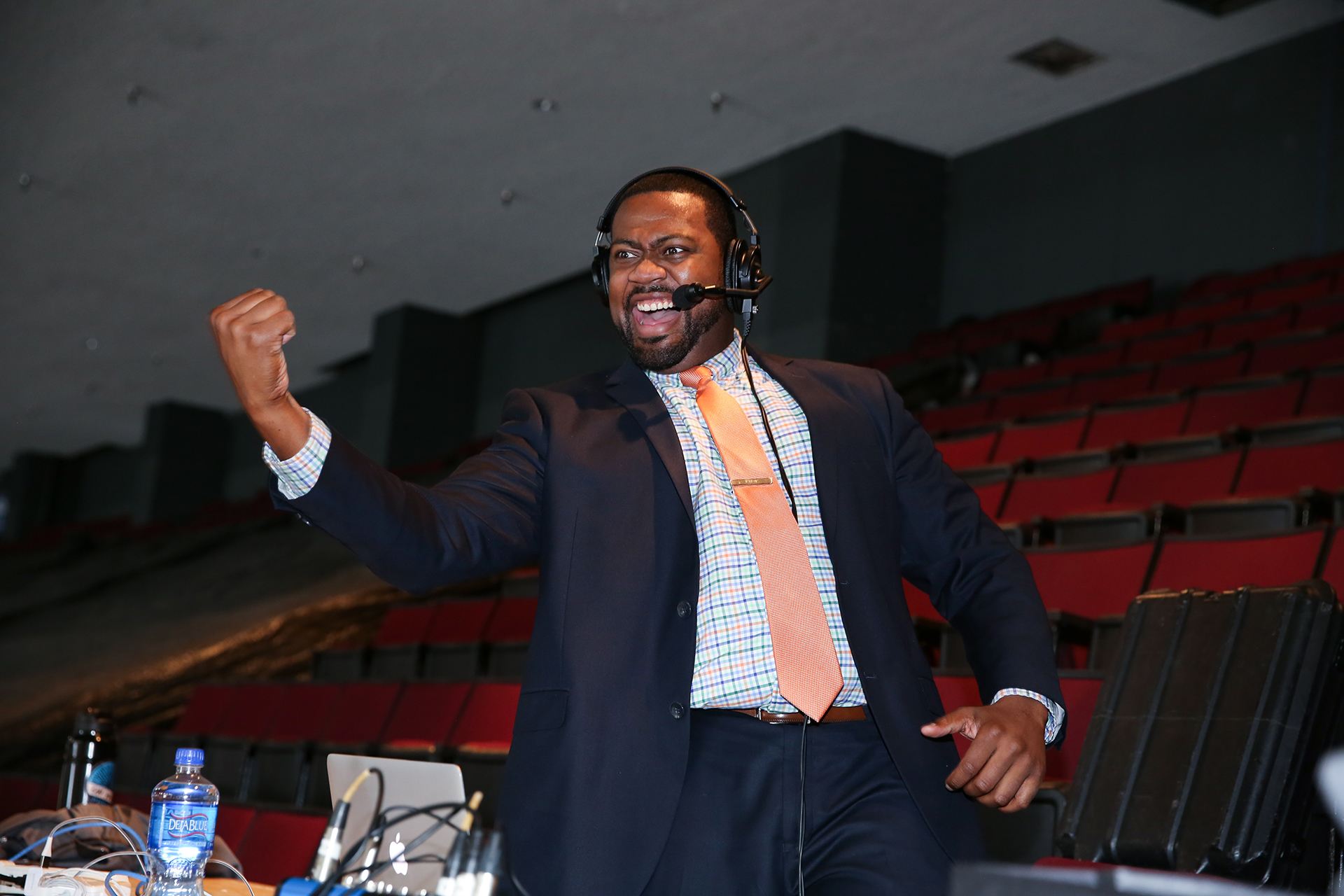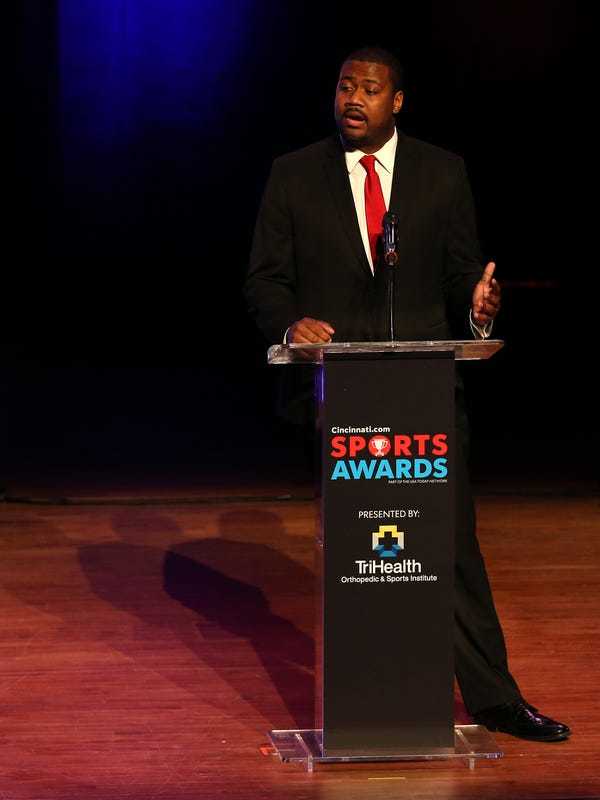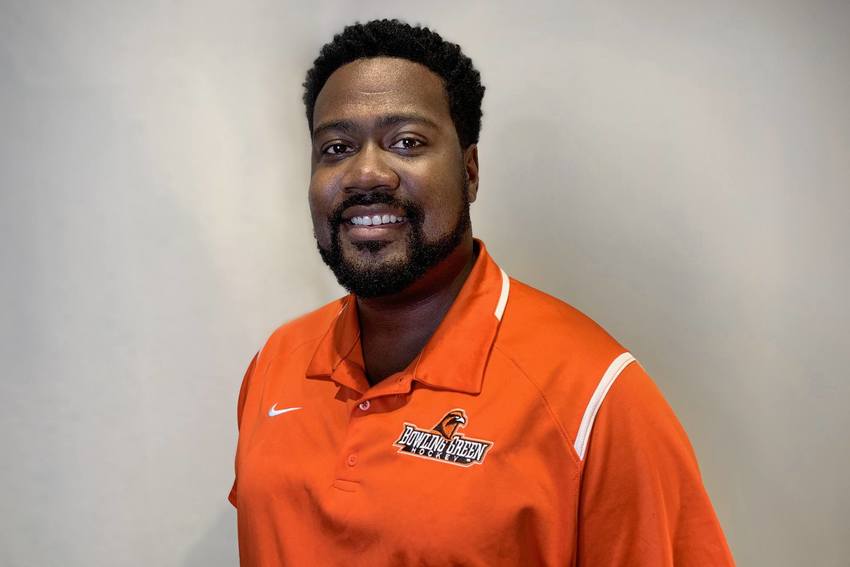
Everett Fitzhugh '11 is first Black broadcaster in NHL
BGSU alumnus to call games for newly created Seattle Kraken
By Bob Cunningham ’18
When Everett Fitzhugh ’11 was named the team broadcaster for the NHL expansion franchise Seattle Kraken this month, he joined a select fraternity of professional hockey play-by-play broadcasters who graduated from Bowling Green State University.
He also is a pioneer.
Fitzhugh became the first Black announcer in the history of the NHL when he was hired by the Kraken, who will begin play during the 2021-22 season. It’s not something he takes lightly.
“I don't think anyone ever really sets out to be that trailblazer, but it’s a responsibility that when you are in a position to help inspire people, to help develop that next wave of hockey media workers and hockey fans — that next generation — I think that your only responsibility to the sport and the culture is to help move that along,” he said. “Over the past few weeks, I've really started to embrace the fact that there are people who were just like me. I was that 8-, 9-, 10-year-old Black kid growing up who didn’t have a whole lot of influences in hockey, but I still found my way and I was able to carve my path through this game.
“If it takes a village to help raise that next generation of Black journalists and Black hockey fans and Black media people, I’m honored to be a part of that village and play any part that I can and make sure that I'm not the only one for a long time. I better not be. I hope there is someone right behind me that I have yet to meet or hear about that is just as passionate as I am and is on their way to the NHL.”
Fitzhugh joins fellow BGSU alumni Michael “Doc” Emrick ’76 and Steve Mears ’02 in the NHL broadcast booth.

Emrick, who has won six national Emmy Awards and is a member of the U.S. Hockey Hall of Fame, is the lead announcer for NHL national telecasts on NBC and NBCSN.
“I cannot think of a team having a better representative in its community than Everett will be,” Emrick said. “Like many forward-thinking hockey organizations in the past — even the Philadelphia Flyers of 1967 — Seattle hired key people a year ahead so they could have a solid groundwork in the community.
“Everett has learned his craft well on the buses of the Falcons and the Cyclones. Not only do you learn the sport from the coaches and players in those hours you travel together, you learn the love for a game that bonds all of you. Now, he moves to the realm of jet aircrafts, larger cities, international star players and a very deserved, exciting life. Yet, I know he won't forget Bowling Green or Cincinnati. He is a good soul who is already thinking of how to keep his skills sharp over the next 12 months before the Kraken play their first game.”
Mears is the television play-by-play voice of his hometown Pittsburgh Penguins on AT&T SportsNet Pittsburgh.
“Anytime someone, especially a play-by-play broadcaster, makes the giant leap from minor league hockey to the NHL, it’s a tremendous accomplishment,” Mears said of Fitzhugh. “The thing that has always impressed me about Everett is his desire to learn and work on his craft. He built his foundation as a broadcaster at BGSU, sharpened his skills in the minors and is now getting rewarded for all of that diligence.
“It’s a great story of someone paying their dues and achieving a dream that isn’t very likely based on the limited amount of NHL jobs that exist. I’m really proud of him and think it’s so cool that he’ll be representing Bowling Green in the NHL. I can’t wait to see him on our first trip to Seattle.”
A lifelong hockey fan realizes his dream
Fitzhugh grew up in Detroit, also known as “Hockeytown” to NHL fans, home of the Red Wings — one of the most storied hockey franchises in North America.
“I was a big hockey fan growing up in Detroit,” he said. “As a young kid, it’s kind of ingrained in you to being a hockey fan and early on.”
He started watching hockey when he was about 9, he said. “I mean, everybody in my class was a hockey fan or played hockey. So, when you're 9 years old, you want to be cool. I went home and I watched hockey.”
Even though Fitzhugh’s fandom was growing, he didn’t see any players he could relate to until he saw the Edmonton Oilers, who had two Black players on the team.
“They had Mike Grier and Georges Laraque on the team, and, for me, it was huge to see two Black faces and people who look like me playing the sport,” he said. “That told me that this game is for me, I have a place in this game and I belong in this game. It was huge to be able to see those guys playing in the NHL and playing at such a high level. That's really where my fandom started.
“It also didn't hurt that the Red Wings won back-to-back Stanley Cups around that time. To be able to be from a city that was at the top of the hockey world for as long as they were definitely helped to grow my love and interest in the game as well.”
Fast forward to Fitzhugh’s fifth season with the Cincinnati Cyclones of the ECHL.
In February, Ryan S. Clark of the sports journalism website The Athletic profiled Fitzhugh, the only Black play-play broadcaster in hockey, for its Black History Month series.
The article put him on Seattle’s radar.
“Tod Leiweke, the chief executive officer and team president of the Seattle Kraken, read the article and reached out to me,” Fitzhugh said. “He was inspired by my story and told me he wanted to talk to me and find out more about me. He wanted to see if I was interested in learning more about what they were building in Seattle and if I would be interested in being a part of it.
“Of course, I was honored and said yes. We kept in touch, we talked throughout COVID-19 and I thought that because of the pandemic this whole process was going to be put on the back burner. He actually emailed me again in May and said, ‘I know the world has been turned upside down, but we're still planning toward 2021 and want to know if you’re still interested in a position here.’
“After a few Zoom interviews, a couple of phone calls and a trip out to Seattle, I landed my dream job as an NHL broadcaster.”

‘Bowling Green was a pretty easy decision’
Fitzhugh knew he wanted to have a career in sports, and BGSU was appealing because it has four sports at the Division I level.
“Attending Bowling Green was a pretty easy decision for me because it gave me a lot of options,” he said. “For me, one of the biggest reasons is I always knew I wanted to work in sports and with Bowling Green having all four sports at the Division I level, it gave me a lot of options. I could do basketball, baseball, football, hockey, whatever the case may be, and it was also close to home.
“I applied to a few other schools in the state of Michigan, but when I looked at all of my options, when I started to compare and contrast, Bowling Green kept coming up at the top of all my lists and what I was looking for.”
He majored in sport management and minored in broadcast journalism. Both disciplines provided the foundation for his career in sports broadcasting.
“Bowling Green allowed me the most sports choices to be able to pursue a career in sports,” Fitzhugh said. “I am very thankful that I came to Bowling Green. I didn’t know it at the time, but I never I would have been able to get so many reps behind the mike at other schools as I did for Bowling Green Radio Sports. I also learned how to produce a game and got such great guidance from my professors. I had so many opportunities to get that real-world experience, starting my freshman year.”
Not only has BGSU produced NHL on-air talent, but the University’s contribution of players, coaches and front office personnel is well documented.
“And don’t forget Mike Johnson (’97) who played in the NHL and works for the NHL Network,” Fitzhugh said. “I guarantee you as many people from Bowling Green State University have left their mark on the sports world, particularly in hockey, as any other school in the country.”
Falcons following in Fitzhugh’s footsteps
Evan Pivnick ’17 has been calling games for the Adirondack Thunder of the ECHL for the past three seasons. He credits Fitzhugh for helping him advance in his career.
“Following in Everett's footsteps as the broadcaster for the hockey team was a tall task and I hope I did it justice, but the fact that he was the gold standard is not surprising,” Pivnick said. “He's passionate, energetic and entertaining — not to mention one of the nicest people you will meet. The guy bleeds orange and brown. Although I did not overlap with Everett during my time at Bowling Green, we were in touch quite a bit, ringing true to the saying ‘Once a Falcon, Always a Falcon.’
“When I was in the hiring process for my job with the Adirondack Thunder, Everett reached out to the team on my behalf, and when I ended up getting the job he was one of the first people I thanked. Now that I've worked in the same league as him for three years, I consider him a great friend. I'm excited to see another face get added to the NHL wall in the hockey lounge at the Slater Family Ice Arena, and I'm even more excited that it's Fitzy’s.”
Ryan Vallon, a student from Littleton, Massachusetts, majoring in media production, is the current play-by-play announcer for the BGSU hockey team. He also hopes to follow in the footsteps of Emrick, Mears, Fitzhugh and Pivnick.
“I think it would be fair to say that BGSU is the cradle of hockey broadcasters because we now have three in the National Hockey League,” Vallon said. “I constantly look up to them because they were all in my seat before I arrived, and they are doing incredible things now on the professional level. Although I’ve never met Everett Fitzhugh in person, his status in Bowling Green Hockey is that of a broadcasting legend and I am so proud of him for getting the chance to call games in the NHL.”
Bowling Green is never too far from his mind
After Fitzhugh left BGSU, he became the manager of communications in the league office for the United States Hockey League in Chicago, before getting back into the booth as the director of media relations/broadcasting with the Youngstown Phantoms of the USHL. He was hired as the director of public relations and broadcasting for the Cyclones in 2015.
In the minors, you have to do a little bit of everything, and Fitzhugh enjoyed adding skills to his repertoire.
“In Cincinnati, I’ve done all the PR and broadcasting, I’ve assisted in marketing, I’ve done social media, team services and travel scheduling for the buses, the planes, the meals and the hotels and all of that stuff,” he said. “I’ve done everything in sports, probably with the exception of selling tickets — I’ve even been the mascot on a couple of occasions. Throughout my career, I've done it all and I’ve worn every single hat. It’s been a wild and crazy ride since I left Bowling Green in 2011.”
Fitzhugh honed his skills in the sport management program and Bowling Green Radio Sports Organization, and both were instrumental to his success.
“I mean, that's where I developed my passion for hockey,” he said. “I could go on for hours talking about how BGRSO mentored me and trained me to make me the broadcaster I am today. And the sport management department, they were so helpful with their advising and internships and everything they had me do — there are way too many people to name.”
Of course, the hockey program had its influence as well. Fitzhugh said seeing where the hockey program is now, an NCAA Tournament-quality team, is great to see, especially because of where it was when he started his collegiate play-by-play career.
“When I took over the play-by-play, we were a year removed from talking about getting rid of the program,” Fitzhugh said. “Jack Vivian and Rob Blake and all of the alumni came and donated their money and their time to help save the program. It was a lean year that first year. I think we won five games, something like that. You know, the recruits still kept coming, the fans still kept coming and the supports kept coming. To see where that program was when I was a student and where it is now has been really special to see. I’m getting choked up now talking about it because it means so much to me.
“I loved my time at Bowling Green. I love the people. Every time the Cyclones played the Walleye in Toledo, my lead-in was always, ‘Welcome to Huntington Center in downtown Toledo, about 20 miles north of God's country, also known as Bowling Green State University.’ I talk about Bowling Green every chance I get. Without Bowling Green, I’m not sitting here right now.”
Updated: 08/31/2020 05:32PM
